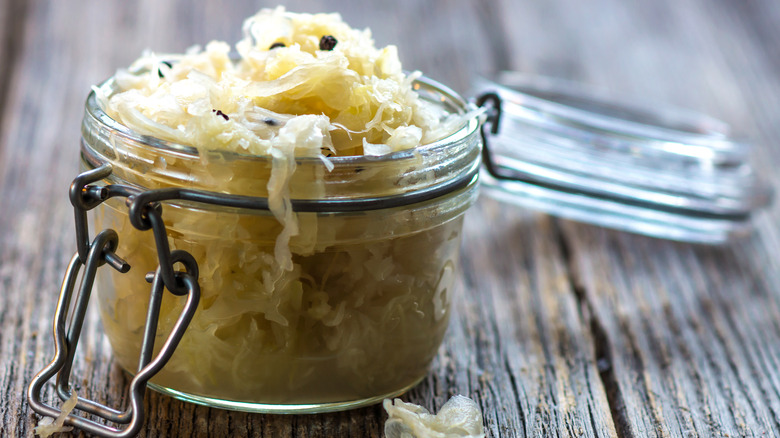Sauerkraut Isn't As German As You Might Think
As far as German dishes go, sauerkraut is generally thought of as an unquestionable staple. The sour, fermented cabbage is so heavily associated with the European country that its soldiers were branded with the disparaging nickname "kraut" in reference to their love of the dish. So, it might be hard to imagine that it could have been invented elsewhere. But while Germans have been eating it regularly since the 1600s, as it turns out, 400 years isn't that long relative to the superfood's history. The fermented food's roots can be traced back to China, where it was developed over a millennia and a half earlier.
That's not to say that modern-day sauerkraut is the exact same dish that existed in China 2,000 years ago. Whereas the Chinese pickled their cabbage in rice wine to make it last, the Germans skipped the extra liquid and switched to salt instead. As a result, their version has its own signature taste that's come to be adored the world over.
How did sauerkraut get to Germany?
While there is more than one theory, it's thought that sauerkraut made its way from China to Germany via the Mongolian empire. The Mongols may have picked up the practice of fermenting cabbage in lactic acid when they invaded China, spreading throughout Eastern Europe in the 13th and 14th centuries. As the fermented food spread west to Germany, its popularity increased and it became so associated with the country that many assume it must have originated there.
Believe it or not, sauerkraut isn't as popular as it once was in Germany. Presently, the average German eats just over two and a half pounds of the stuff each year. While that may sound like a lot, they ate almost two pounds more just 40 years ago. Americans, on the other hand, take in about a pound and a half annually, which shows that the fermented food didn't stop spreading around the globe after it reached Germany.
Reasons to eat sauerkraut
There are likely any number of reasons for sauerkraut's popularity among the Germans. Its sour flavor meshes well with salty foods like bratwurst, balancing out the rich fat with a refreshing crunch. Then, of course, there are the health benefits. Many fermented foods are chock full of gut-enhancing probiotics – and sauerkraut is one of them. This would have been helpful for Europeans when it was introduced to the continent, seeing as modern refrigeration didn't exist yet. Probiotics help keep the digestive system running smoothly, which many people probably appreciated at the time. But it's also as good a reason as any to add more sauerkraut to your life, especially since having a healthy gut has been associated with a robust immune system.
Sauerkraut is also a source of high levels of essential vitamins and minerals, especially Vitamin C. It's known for its copper, iron, potassium, and manganese content, as well as B6 and folate. One downside is that although sauerkraut doesn't taste super salty, it does have a high level of sodium in it, thanks to how it is made. But that shouldn't stop most people who aren't on salt-restricted diets from being able to enjoy it and reap the benefits. Even though the Germans didn't invent sauerkraut, it's worth thanking them for popularizing it.


